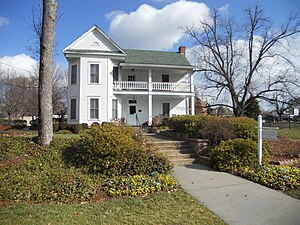Dunwoody, Georgia
| City of Dunwoody | ||
|---|---|---|
| City | ||

The Dunwoody Farmhouse, historic center of the community
|
||
|
||
 Location in DeKalb County and the state of Georgia |
||
| Coordinates: 33°56′34″N 84°19′4″W / 33.94278°N 84.31778°WCoordinates: 33°56′34″N 84°19′4″W / 33.94278°N 84.31778°W | ||
| Country | United States | |
| State | Georgia | |
| County | DeKalb | |
| Government | ||
| • Type | Council-Manager | |
| • Mayor | Denis Shortal | |
| • City Manager | Eric Linton | |
| Area | ||
| • Total | 13.2 sq mi (34.1 km2) | |
| • Land | 12.9 sq mi (33.5 km2) | |
| • Water | 0.2 sq mi (0.6 km2) | |
| Elevation | 1,129 ft (344 m) | |
| Population (2012) | ||
| • Total | 47,224 | |
| • Density | 3,648/sq mi (1,408.5/km2) | |
| Time zone | Eastern (EST) (UTC-5) | |
| • Summer (DST) | EDT (UTC-4) | |
| ZIP codes | 30338, 30346, 30360 | |
| Area code(s) | 770, 678, 470 | |
| FIPS code | 13-24768 | |
| GNIS feature ID | 0325929 | |
| Website | dunwoodyga |
|
Dunwoody is a city located in DeKalb County, Georgia, United States. It is a northern suburb of Atlanta. Dunwoody became incorporated as a city on December 1, 2008. As of 2015, the city has a population of 48,733, up from 46,267 in the 2010 Census.
The Dunwoody area was established in the early 1830s and is named for Major Charles Dunwody (1828–1905), an extra "o" added with the incorrect spelling of the name on a banking note. Charles Dunwody originally returned to Roswell after fighting in the Civil War, in which he fought for the secession of the Confederate states.
One of Dunwoody's most historic buildings dates from 1829. The Ebenezer Primitive Baptist Church, at the corner of Roberts Drive and Spalding Drive, is still active to this date and is also the home to one of the city's oldest cemeteries, where many of the founding fathers of Dunwoody are buried. The first public school, Dunwoody Elementary, first stood near the city center at the intersection of Chamblee-Dunwoody Road and Mount Vernon Road. It was in continuous operation from 1911 to 1986. A fire destroyed the school's cafeteria in 1966, which was on the corner of Womack Road and Chamblee-Dunwoody Road. On that site today, the Dunwoody branch of the Dekalb County Public Library now operates along with the North Dekalb Cultural Arts Center. In 1881, the Roswell Railroad opened and ran along what is now Chamblee-Dunwoody Road north to the Chatahoochee River. It operated for 40 years, and in 1905, President Theodore Roosevelt made a campaign whistle stop in Dunwoody along the way to Roswell, Georgia.
On account of the railroad, Dunwoody developed into a small crossroads community. The community continued to grow and prosper even after the railroad shut down in 1921. Dunwoody remained rural until suburban residential development was initiated in the 1960s. In 1971, the Spruill family sold a large portion of their property for the construction of Perimeter Mall, with the completion of Dunwoody Village occurring the same year.
In early 2006, a study was conducted by the Carl Vinson Institute of Government of the University of Georgia, to determine how feasible it would be to incorporate Dunwoody as a city. Critics claimed that incorporation of Dunwoody, as in the incorporation of Sandy Springs in 2005, would take away a great deal of tax revenue from the rest of the county, leading to shortages of services, tax increases, or both for everyone else in the county, as has happened in Fulton. Citizens for Dunwoody, Inc. was the non-profit advocacy group begun by Senator Dan Weber to promote the effort.
...
Wikipedia

